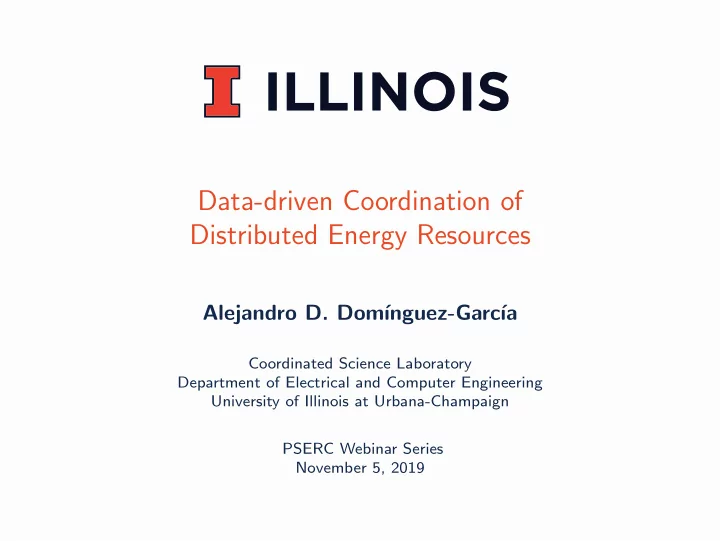

Data-driven Coordination of Distributed Energy Resources Alejandro D. Dom´ ınguez-Garc´ ıa Coordinated Science Laboratory Department of Electrical and Computer Engineering University of Illinois at Urbana-Champaign PSERC Webinar Series November 5, 2019
Outline 1 Introduction 2 DER Coordination for Active Power Provision 3 LTC Coordination for Voltage Regulation 4 Concluding Remarks
Impacts of Renewable-Based Power Generation Resources ◮ Deep penetration of renewable-based generation imposes additional requirements on ancillary services including: • Frequency regulation (in bulk power systems) • Reactive power support (in distribution systems) ◮ Frequency regulation in bulk power systems is typically achieved by controlling large synchronous generators • Resources in distribution systems are not utilized for this task ◮ Reactive power support in distribution systems is provided by devices such as load tap changers (LTCs) and fixed/switched capacitors • These devices are not designed to manage high variability in voltage fluctuations induced by renewable-based generation Dom´ ınguez-Garc´ ıa (ECE ILLINOIS) Data-driven Coordination aledan@ILLINOIS.EDU 1 / 32
The Solution ◮ An increasing number of DERs are being integrated into distribution systems ◮ DERs could potentially be utilized to provide ancillary services if properly coordinated by, e.g., an aggregator PV systems Electric Vehicles Fuel Cells Residential Storage Dom´ ınguez-Garc´ ıa (ECE ILLINOIS) Data-driven Coordination aledan@ILLINOIS.EDU 2 / 32
Need for Data-Driven Coordination G tie line aggregator G bulk power system power distribution system ◮ DER aggregators needs to develop appropriate coordination schemes so DERs can collectively provide services that meet certain requirements ◮ Model-based schemes may be infeasible due to the lack of accurate models ◮ Data-driven schemes that only rely on measurements provide a promising alternative for developing efficient coordination schemes Dom´ ınguez-Garc´ ıa (ECE ILLINOIS) Data-driven Coordination aledan@ILLINOIS.EDU 3 / 32
Presentation Overview Objective To develop data-driven coordination frameworks for assets (DERs, LTCs) in distribution systems ◮ Part I. Active power provision problem • total active power exchanged between the distribution and bulk systems needs to equal to some amount requested by the bulk system operator ◮ Part II. Voltage regulation problem • the voltage magnitude at each bus needs be maintained to stay close to some reference value Dom´ ınguez-Garc´ ıa (ECE ILLINOIS) Data-driven Coordination aledan@ILLINOIS.EDU 4 / 32
Outline 1 Introduction 2 DER Coordination for Active Power Provision 3 LTC Coordination for Voltage Regulation 4 Concluding Remarks
Recommend
More recommend